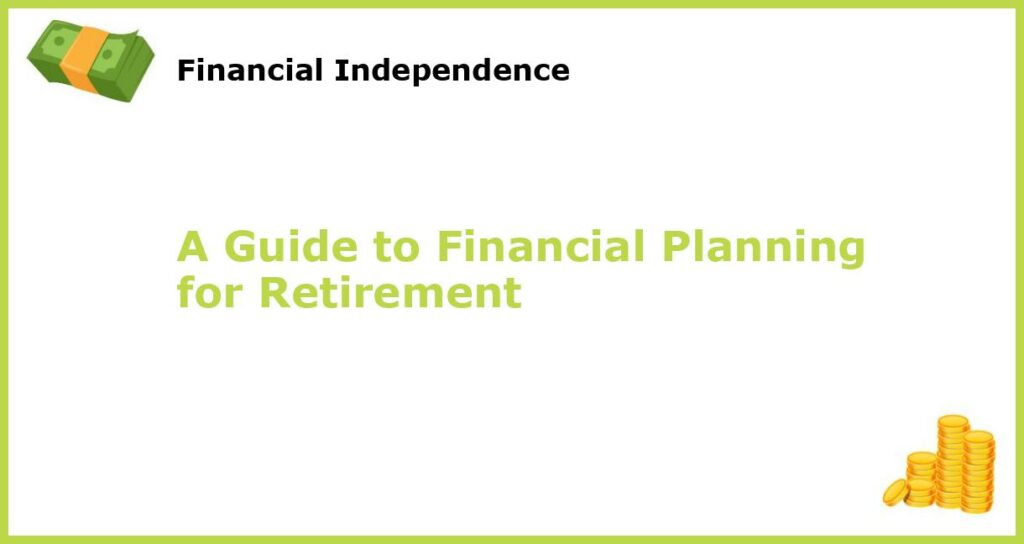Retirement planning is a complex process that requires careful consideration of various factors. According to many financial experts, one of the most critical factors to consider when planning for retirement is how much money you will need to live on after you stop working. Your retirement budget will depend on several factors, including your current lifestyle, expected longevity, health, and retirement goals. To make informed decisions about your retirement plan, you must start by assessing your individual needs and circumstances.
Retirement Planning: What You Need to Know

Before retiring, you must consider what type of lifestyle you want to maintain in your retirement years. Will you travel and dine out, or are you more comfortable staying in and enjoy a minimalistic lifestyle? Consider your current expenses, like utilities, home mortgage, students loan, and deduct expenses relating to work. Another critical component to consider is determining the length of time you’ll be in retirement since this will impact how much money you need to save. Some retirement experts recommend having enough funds to cover at least 20 to 25 years of living expenses.
The Importance of Starting Early

As previously mentioned, one of the keys to successful retirement planning is starting early. While the thought of retirement might seem far-off particularly for young adults in their 20s, it is important to recognize the value of time in building wealth. The earlier you begin saving and investing, the more time you have to accumulate wealth and take advantage of compound interest. Compound interest is the interest earned on both Principal and Interest amount that is reinvested, generating exponential growth down the line. The effect of compounding requires years of patience but results in a significant amount of wealth accumulation at the end of your savings period.
Understanding Your Retirement Accounts

Several retirement accounts are available, including 401(k)s, IRAs, and Roth IRAs. Each account’s features and limitations, as well as the tax implications, differ from the other, so it’s essential to understand which account works best for you. Employer-sponsored accounts like 401(k)s and 403(b)s have higher yearly savings limits, employer matching contributions, and other incentives. Roth IRAs allow you to withdraw funds tax-free during retirement if you meet eligibility requirements but do not offer a tax deduction at the time that contributions are made. Traditional IRAs, on the other hand, give you short-term tax advantages. The amount you save on your income taxes at present could be used to help increase your retirement fund through investment earning accumulation.
Investing for Retirement: Balancing Risk and Reward

Investing for retirement is an essential aspect of retirement planning that involves balancing risk and reward. The higher the potential returns of your investments, the more significant the risks you will face. At the same time, more conservative investments are more stable and secure as well as produces fewer returns. Therefore, no matter what investments you choose for retirement, it is crucial to develop a balanced investment portfolio that takes into account your age, risk tolerance, and retirement goals. Diversifying your portfolio through a variety of assets in different markets and sectors can help minimize potential risks while maximizing profits.
Minimizing Taxes: Strategies for Retirement Planning

While planning your retirement, tax minimization is another critical financial aspect to consider. By minimizing taxes on your incomes and investments, you can make your retirement savings go further. To achieve this, you must contribute to tax-deferred retirement accounts, take advantage of some tax credits and deductions and strategically time your retirement account withdrawals. Additionally, rollovers or conversions to different accounts, charitable contributions, or investing in municipal bonds, which have tax-free yields, can help you minimize the amount you pay in taxes on your retirement funds.
Creating a Retirement Budget

A budget is necessary for planning your retirement finances, and it helps determine how much you should save, invest, and spend to ensure a comfortable lifestyle. Your budget should consider all your future expenses in retirement, from housing and healthcare to entertainment and travel. To ensure you have enough money to enjoy your golden years, it’s essential to make sure that the budget you prepare is scalable and realistic.
Social Security: Maximizing Your Benefits
Maximizing social security benefits is critical in retirement planning, as for many people, this is a significant source of income. To optimize your social security benefits, you should try to delay your retirement and claim social security benefits later, as every year you delay your retirement, your benefits will increase by up to 8%. Additionally, being strategic about spousal benefits can increase benefits as well. Social Security Administration offers guidance and resources about benefit strategies, and you can work with financial advisors specializing in retirement planning to help navigate this complex process.
Managing and Protecting Your Retirement Funds
Managing and protecting your retirement funds is a critical component of retirement planning. Proper management of retirement assets involves monitoring your investments regularly and rebalancing the portfolio when necessary. Another essential aspect of managing your funds is by protecting your assets through insurance and estate planning. Insurance protection offers financial security, covering health care costs and Protection against unforeseen circumstances like an accident or disability that might reduce your retirement savings. Estate planning helps protect your assets and offers financial protection for your family.
Working with a Financial Advisor
If you need help with your retirement planning, consider working with a professional financial advisor. They can provide personalized retirement planning advice and help you develop an investment strategy that aligns with your retirement goals. A financial advisor experienced in retirement planning can help you navigate the complex tax and legal landscape and help you create a retirement plan that provides a financially secure future.
Staying on Track: Reevaluating Your Retirement Plan
As previously stated, retirement planning is not a one-time event. Regular evaluation of your retirement plan is necessary to stay on track and make any necessary adjustments. Your budget, portfolio, and investment strategy should be reviewed annually, taking into account financial, economic, and individual changes that occurred during the year. Retirement planning experts suggest you consider altering your strategy if your financial goals change, costs of living increase or unexpected family issues arise. When reassessing your retirement plan, make sure to keep current life events in mind, as they may alter your retirement goals and needs.







